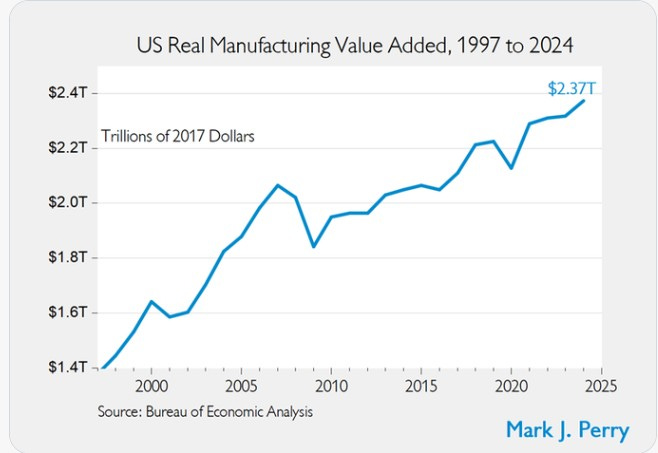Five new vibes getting me excited to teach Operations Excellence this fall
I’ve been teaching Operations Excellence in Northwestern’s MEM program since 1999. Back then, the class was called Factory Physics based on the great textbook of the same name by Hopp and Spearman.
The name changed because the class now applies to operations more broadly, not just manufacturing. For example, good operations principles apply to healthcare, retail, services, and software development, to name a few.
But manufacturing will always be part of the course. It is an important part of an operations class, and I have a soft spot for it.
Also, manufacturing has always been part of the national political conversation— mostly around offshoring and job losses.
It is important to keep in mind that, despite the rhetoric, the US still makes a lot of stuff. The following is a graph from economist Mark Perry.
Seeing this graph, you might argue that the US can no longer make the right stuff, but US manufacturing output continues to grow.
Of course, a lot of the discussion isn’t about output, it’s about jobs. That data isn’t nuanced: factory jobs are decreasing (just like agriculture jobs did).
The following is a typical chart showing declining factory jobs I found on the Our World in Data website:
The rhetoric and jobs data have followed what I’ve seen in my class. I’ve seen a steady decline in students who work in or are interested in manufacturing (except for last year)1.
But, over the last year, the vibe around manufacturing seems to have shifted. Here are five vibes I’ve picked up on that get me excited to talk about manufacturing again.
One, making physical things is cool again.
Sometimes, you need a shared culture moment for an idea to catch on. SpaceX catching a rocket falling from space might have been that moment. It was an impressive engineering accomplishment that caught the public’s imagination. Making physical things was cool again.
Two, VCs are investing in manufacturing.
Within the last year, I’ve noticed an uptick in VC interest in manufacturing. Mostly this is in hard tech (think of things like SpaceX, batteries, energy). Up until recently, VCs were almost exclusively focused on software.
If you want to learn more about this trend, the place to start is Kathrine Boyle (see this long podcast) and a16z’s American Dynamism practice. SpaceX and the defense company Anduril proved that this was an area for VC firms. (Anduril’s CEO, Palmer Luckey, has interesting things to say on podcasts if you like that space.)
It isn’t just a16z. I met a VC at a conference this week who was talking about innovations in areas like mining, too. And the next bullet point talks about the trend more broadly.
Three, people are talking about Reindustrialization. My VC friend, Patrick Hunt, wrote a great article on three types of reindustrialization and one phony type.
His article lays out three types of reindustrialization: Deep Tech Hardware, National Champions, and Software Tools for Design and Manufacturing. He frames the discussion in terms of risk and introduced me to the Tool or Die podcast.
I love it that his phony type was “Nostalgia.” This is not about adding costs and re-creating jobs of the past.
Four, people are talking about operational excellence.
I’ve seen this at two levels.
First, at the detailed level, companies are talking about how to make things more efficiently. A recent WSJ article (“The Man Tasked With Nailing Ford’s Next Model T Moment,” paywall link) highlights how Ford is planning to make a cheap electric truck with ideas from Tesla, like “first-principles thinking”, minimizing parts, and having three production lines vs one.
Second, I’m seeing this idea applied to the leadership, too. This means having a leader at the top of the organization who loves and understands the business. In the 1990s Factory Physics book, Hopp and Spearman blame some of the US decline in manufacturing on the rise of financial leaders to the top of manufacturing firms rather than operations leaders.
Last year, an a16z podcast, “AI, Robotics & the Future of Manufacturing,” had a great discussion on who should be a CEO, a general manager, or someone who knows the core thing. For example, should the CEO of Boeing be someone who is great at making airplanes or a management generalist? They make a good case for the former.
This is similar to a story from 2023 about how Barnes and Noble turned around by putting in a CEO who loved books.
Five, Temple Grandin, visual thinking, and a renewed interest in the trades
This was the most serendipitous one on the list. I went to a keynote speech by Temple Grandin this summer. I didn’t know anything about her and went to hear a different perspective. Here was part of her bio: “One of the world’s most accomplished and well-known adults with autism, Temple Grandin has a PhD in animal science from the University of Illinois and is a professor at Colorado State University.”
I wasn’t expecting this to tie into the themes of American Dynamism and Reindustrialization. But, it did.
She started the talk with different ways people’s minds work: verbal thinkers, math thinkers, and visual thinkers. Many people are a combination of these. She is an extreme visual thinker— she thinks in pictures.
She said that being an extreme visual thinker makes her good at designing and building complex mechanical systems. In fact, she’s designed and helped build something like 50% of the meat processing plants in the US. But she readily admits that she still can’t (and won’t be able to) do algebra.
She said that many small companies that design and build mechanical systems are a lot like her— visual thinkers, some with a large percentage with autism.
A big part of her talk was about the need to bring physical skills, like shop, back to schools so kids who think like this can see that they are good at it.
This reminds me of an animation my son did for an organization helping high schoolers train for good jobs in the trades:
Temple Grandin wants to give visual thinkers a chance to shine. We shouldn’t let a lack of algebra skills get in the way of another generation of people who could excel in building and fixing mechanical systems. I hope it happens.
Of course, my data is skewed by the types of students who apply to MEM and get in.







Great post Michael, keep up the good work!